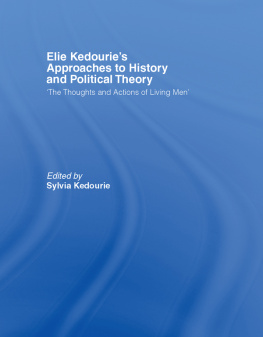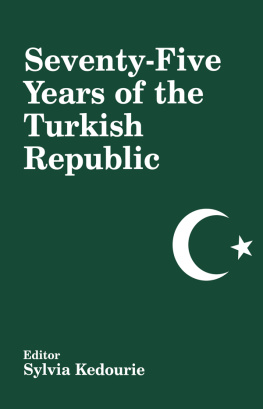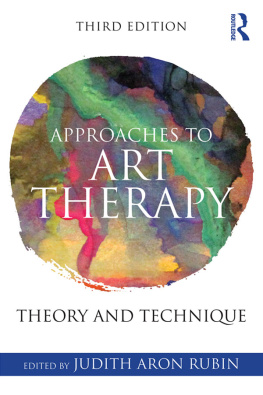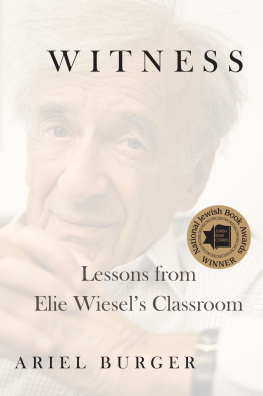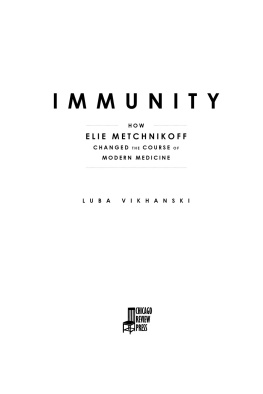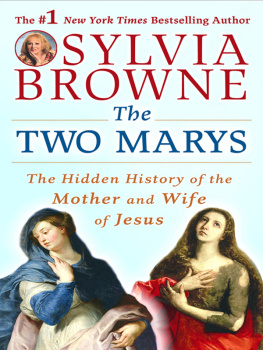Elie Kedouries Approaches to History and Political Theory
Kedourie was a remarkable man far more remarkable than the world, or he himself acknowledged in his lifetime. Oliver Letwin
Controversy raged over Elie Kedouries radical interpretation of the history of the Ottoman Empire and the Middle East. He was one of the most influential historians of the twentieth century. During a long career in the Department of Politics at the London School of Economics, Kedourie inspired generations of students. A dedicated scholar and meticulous teacher, he founded Middle Eastern Studies, a journal which, forty years after its launch, remains one of the leading publications in the field and a monument to his work.
This collection brings together a range of distinguished scholars to evaluate Kedouries contribution not only to Middle Eastern history but also to political thought, and to assess the impact of his scholarship.
The volume contains a bibliography of his writings.
This book was previously published as a special issue of Middle Eastern Studies.
Elie Kedouries Approaches to History and Political Theory
The Thoughts and Actions of Living Men
Edited by Sylvia Kedourie
First published 2006 by Routledge
2 Park Square, Milton Park, Abingdon, Oxon, OX14 4RN
Simultaneously published in the USA and Canada
by Routledge
270 Madison Ave, New York, NY 10016
Routledge is an imprint of the Taylor & Francis Group, an informa business
2006 Taylor & Francis
Typeset by KnowledgeWorks Global Limited, Southampton, Hampshire, UK
Printed and bound in Great Britain by Antony Rowe Ltd, Chippenham, Wiltshire
All rights reserved. No part of this book may be reprinted or reproduced or utilised in any form or by any electronic, mechanical, or other means, now known or hereafter invented, including photocopying and recording, or in any information storage or retrieval system, without permission in writing from the publishers.
British Library Cataloging in Publication Data
A catalogue record for this book is available from the British Library
Library of Congress Cataloging in Publication Data
A catalog record for this book has been requested
ISBN: 0-415-39675-1
ISBN: 978-0-415-39675-2
Contents
Sylvia Kedourie
Sylvia Kedourie
Elie Kedourie
Paschalis M. Kitromilides
M. E. Yapp
Nol OSullivan
Michael Sutton
Peter Roberts
This book which first appeared as a special issue of Middle Eastern Studies is dedicated to the memory of Elie Kedourie, a man of many and varied academic interests. A number of scholars have written essays, each discussing a different aspect of Elies scholarly contribution. They have all graciously consented to devote precious time in their overworked schedule to give me the benefit of their understanding of his work. To them all I owe a debt of gratitude.
Thanks are also due to Caroline Steenman-Clarke for her initial sifting of material for the bibliography which appears at the end of this volume. She sorted out the mass of cuttings scattered in a variety of boxes and envelopes, which she listed and filed. This initial work enabled our daughter Helen Grubin to rearrange these lists thematically as the collected works now appear in the bibliography. To her too thanks are due.
The bibliography is now as complete and as up to date as possible. Items in all but two sections are arranged in chronological order. The two sections, Articles by Elie Kedourie and Review articles by Elie Kedourie, are arranged alphabetically by publication with items arranged chronologically below each title. Some entries may seem incomplete; I could not always find details of the date and source of publication. Articles in The Times Literary Supplement which were originally published anonymously are listed without authorial attribution, although it is now possible to trace this. Three items which did not appear in the special issue of Middle Eastern Studies have now been added to the bibliography.
Some Hebrew transliteration of the names of unfamiliar reviewers may not have been correctly re-transliterated into Roman characters; this is inevitable given the nature of a Semitic language. All corrections or additions will be gratefully received. The section on Citations is rather haphazard, no special research having been undertaken; the items listed there are only those items which happened to come to our attention.
I am also grateful to the friends and colleagues who have filled me in with various details, and who are too numerous to be mentioned by name. I thank them all most kindly. I would also like to thank the friends who have alerted me to some factual, as well as typographical, errors in the special issue. These mistakes I hope have all been corrected.
This work would not have been possible without the forty happy years of cooperation with Frank Cass, the original publisher of Middle Eastern Studies; I would like to express my appreciation to him. Finally I would like to mention Jonathan Manley who has so efficiently and quietly dealt with all my requests for the past 15 years.
Sylvia Kedourie
Nov. 2005
SYLVIA KEDOURIE
Elie Kedourie, CBE, BSc. Econ. (Lond.), Dr.h.c. (TAU), FBA, was Professor of Politics at the London School of Economics and Political Science (LSE). A dedicated teacher and meticulous scholar, he devoted himself wholly to his work. During his forty years of academic life, he used an assistant only once, when due to ill health, he had someone to copy for him some references from the Public Records Office (PRO) archives. Even while teaching in the USA where most teachers seemed to delegate the marking of essays to their research or junior assistants, he would, to the surprise of some colleagues, insist on correcting all the undergraduate essays personally. This way, he would say to me, I know what I have taught and what they have learnt. I remember that in one term he had some fifty essays to correct.
The precision and concision with which he wrote he attributed to his favourite French teacher, M. Capon who would admonish his pupils regarding the writing of essays: Ce nest pas de la pte de guimauve he would say an essay is not marsh-mallow, that is oversweet but vapid waffle. In his writing, always devoid of jargon and flowery phraseology, Elie could be deceptively easy to read. The mastery he had over his subject, his breadth of learning, his deep familiarity with Arabic, French and English language and literature, thanks to his early schooling at the Alliance Israelite Universelle school in Baghdad, coupled with an acute memory and a sharp sense of observation, gave him a scope and a dimension different from that of his colleagues at the School who mostly came from a purely Western and English-speaking background.
In this volume a number of scholars discuss various aspects of his work. In my essay, I shall describe his method of work, and give some background on his study of nationalism, historiography, Middle East history, conservatism, Jewish themes, and of course Middle Eastern Studies, as well as his relationship with Michael Oakeshott. I am also enclosing an unpublished International Seminar Report on The Cyprus Problem and its Solution which he wrote when he acted as rapporteur at a meeting in Rome in 1973 at the Center for Mediterranean Studies, American Universities Field Staff.

